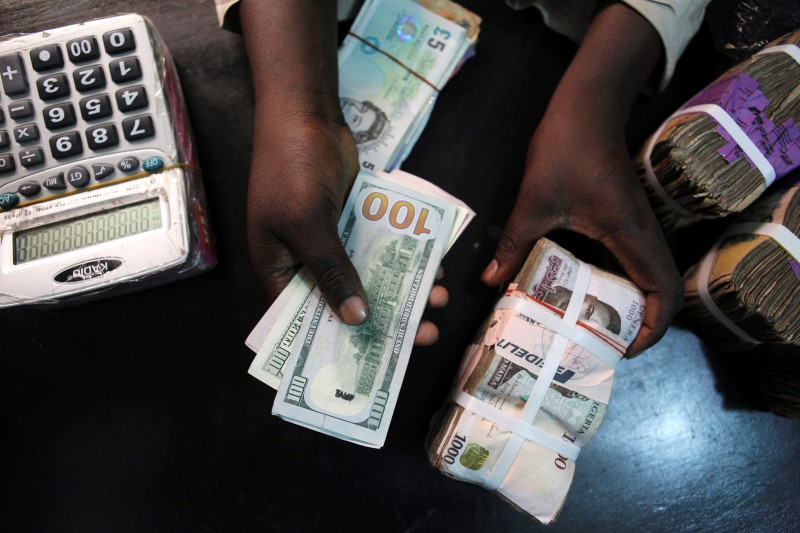ABUJA, Sept 14 (Reuters) - The Nigerian naira NGNFX=BDCN
fell by 1.09% to 460 naira on the black market on Monday after
the president last week told the central bank to stop dollar
sales for food and fertiliser imports.
President Muhammadu Buhari on Thursday directed the central
bank to stop selling foreign exchange for those imports, similar
to an order issued last year. Nigeria faces its worst economic crisis in four decades
triggered by an oil price crash induced by the novel coronavirus
pandemic. The crisis has slashed government revenues, weakened
the currency and created large financing gap for Africa's
biggest economy.
The naira had firmed sharply two weeks ago on the black
market after the central bank resumed dollar sales to
individuals and investors to try to clear demand.
But sales have not being enough, traders say, with pressure
piling up on the currency. The country has spent 16.6% of its
dollar reserve from last year to $35.77 billion.
Dollar liquidity dried up on the spot market after foreign
investors dumped Nigerian assets following the oil price crash.
However, a central bank's forex sales has also been inadequate.
Volumes on the spot market, widely quoted by foreign
investors and imports, declined from a peak of $1.3 billion in
February to a low of $3.9 million last month.
On the official market supported by the central bank, the
naira NGN=D1 traded at 381 to the dollar, while it was quoted
at 385.83 naira NAFEX=FMDQ on the spot market on Monday.
"It doesn't help that some ... pronouncement ... will likely
send more demand to (black) market," one trader said. "These
developments put more pressure on the parallel market rates,
particularly in the midst of very little supply."
- English (USA)
- English (UK)
- English (India)
- English (Canada)
- English (Australia)
- English (South Africa)
- English (Philippines)
- Deutsch
- Español (España)
- Español (México)
- Français
- Italiano
- Nederlands
- Português (Portugal)
- Polski
- Português (Brasil)
- Русский
- Türkçe
- العربية
- Ελληνικά
- Svenska
- Suomi
- עברית
- 日本語
- 한국어
- 简体中文
- 繁體中文
- Bahasa Indonesia
- Bahasa Melayu
- ไทย
- Tiếng Việt
- हिंदी
Nigeria naira eases on black market after order to ban FX for food imports
Published 14/09/2020, 17:14
Nigeria naira eases on black market after order to ban FX for food imports

Latest comments
Install Our App
Risk Disclosure: Trading in financial instruments and/or cryptocurrencies involves high risks including the risk of losing some, or all, of your investment amount, and may not be suitable for all investors. Prices of cryptocurrencies are extremely volatile and may be affected by external factors such as financial, regulatory or political events. Trading on margin increases the financial risks.
Before deciding to trade in financial instrument or cryptocurrencies you should be fully informed of the risks and costs associated with trading the financial markets, carefully consider your investment objectives, level of experience, and risk appetite, and seek professional advice where needed.
Fusion Media would like to remind you that the data contained in this website is not necessarily real-time nor accurate. The data and prices on the website are not necessarily provided by any market or exchange, but may be provided by market makers, and so prices may not be accurate and may differ from the actual price at any given market, meaning prices are indicative and not appropriate for trading purposes. Fusion Media and any provider of the data contained in this website will not accept liability for any loss or damage as a result of your trading, or your reliance on the information contained within this website.
It is prohibited to use, store, reproduce, display, modify, transmit or distribute the data contained in this website without the explicit prior written permission of Fusion Media and/or the data provider. All intellectual property rights are reserved by the providers and/or the exchange providing the data contained in this website.
Fusion Media may be compensated by the advertisers that appear on the website, based on your interaction with the advertisements or advertisers.
Before deciding to trade in financial instrument or cryptocurrencies you should be fully informed of the risks and costs associated with trading the financial markets, carefully consider your investment objectives, level of experience, and risk appetite, and seek professional advice where needed.
Fusion Media would like to remind you that the data contained in this website is not necessarily real-time nor accurate. The data and prices on the website are not necessarily provided by any market or exchange, but may be provided by market makers, and so prices may not be accurate and may differ from the actual price at any given market, meaning prices are indicative and not appropriate for trading purposes. Fusion Media and any provider of the data contained in this website will not accept liability for any loss or damage as a result of your trading, or your reliance on the information contained within this website.
It is prohibited to use, store, reproduce, display, modify, transmit or distribute the data contained in this website without the explicit prior written permission of Fusion Media and/or the data provider. All intellectual property rights are reserved by the providers and/or the exchange providing the data contained in this website.
Fusion Media may be compensated by the advertisers that appear on the website, based on your interaction with the advertisements or advertisers.
© 2007-2024 - Fusion Media Limited. All Rights Reserved.